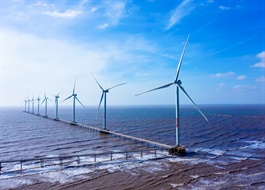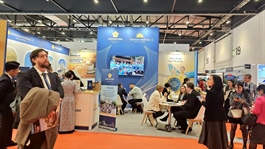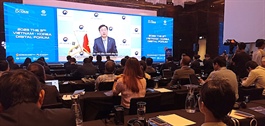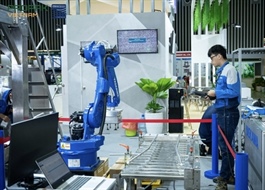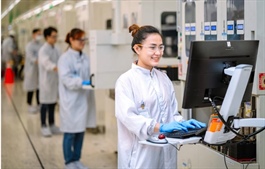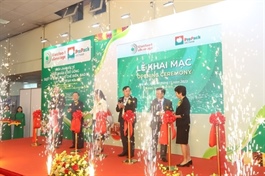Unilever heads towards a net-zero value chain by 2039
Unilever heads towards a net-zero value chain by 2039
Unilever Vietnam has reaffirmed its commitment to climate action by building a carbon net-zero value chain by 2039. This commitment aligns with the global push towards sustainability and the need to address climate change.

Lê Thị Hồng Nhi, Head of Communications and Corporate Affairs of Unilever Vietnam. VNS Photo |
According to Lê Thị Hồng Nhi, Head of Communications and Corporate Affairs of Unilever Vietnam, Unilever is prioritising the building of a net-zero emissions value chain by 2039. This commitment aligns with the global push towards sustainability and the need to address climate change. By focusing on reducing greenhouse gas emissions and implementing sustainable practices, Unilever aims to make a practical contribution to national strategic goals for a sustainable future.
Challenges and opportunities
In Việt Nam, Unilever faces several significant challenges in its pursuit of sustainability and corporate responsibility. These challenges include managing a large and diverse supply chain, investing in infrastructure, influencing consumer behaviour, navigating complex regulations, fostering collaboration with relevant parties, and measuring the effectiveness of its sustainability initiatives.
Implementing sustainable practices often requires significant investment in infrastructure, such as eco-friendly manufacturing facilities, renewable energy systems, and waste management systems. This can be especially challenging in developing countries where the desired standards may not be easily met, and the costs may be prohibitive. Unilever needs to find ways to navigate these barriers, such as collaborating with local governments, seeking financing options, and leveraging technology to achieve sustainability goals more efficiently.
To handle challenges, Unilever recognises the need to influence consumer preferences and behaviour regarding sustainable consumption. This includes marketing campaigns, product labelling, and educational initiatives aimed at informing consumers about the positive environmental and social impact of their purchasing decisions.
In addition, Unilever operates in a complex regulatory landscape characterised by local and international regulations and standards. Adhering to these regulations is crucial for the company's sustainability efforts. Unilever needs to stay updated on evolving regulations and ensure compliance.
Achieving sustainability goals requires collaboration and commitment from various stakeholders. Unilever needs to foster strong partnerships with businesses throughout its supply chain, working together to implement sustainable practices and share best practices.
To track progress and ensure continuous improvement, Unilever must measure the effectiveness of its sustainability initiatives. This involves setting clear and ambitious goals, establishing key performance indicators (KPIs), and regularly monitoring and reporting on the company's performance against these targets. By demonstrating tangible results, Unilever can showcase its commitment to corporate responsibility and contribute to global efforts in combating climate change and resource depletion.
In today's workforce, employees are not only looking for basic benefits but they also want to work for companies that demonstrate social responsibility and promote an open, diverse, and equal work environment. Unilever's strong ESG commitments and sustainability practices make it an attractive employer, helping the company attract and retain top talents in Việt Nam.
Main targets
The recycling industry in Việt Nam faces common obstacles experienced by many countries around the world. Transitioning to a more sustainable and efficient recycling system requires addressing several key issues.

Unilever factories in Củ Chi and Bắc Ninh have met net zero emissions. — Photo courtesy of Unilever Vietnam |
Synchronised classification and collection processes are crucial for effective recycling. In addition, applying post-consumer recycled (PCR) plastics in packaging production brings certain challenges. Switching to recycled materials requires businesses to make efforts to restore the quality of used plastics to ensure the design, colour, shape, and quality of PCR plastic packaging. Unilever has achieved a 63 per cent of recyclability rate and a 52 per cent reduction in virgin plastic use through direct reduction and inclusion of post-consumed resin (PCR) plastics
Technology and innovation play a crucial role in helping Unilever Vietnam address barriers and promote the use of PCR plastic in packaging production. By leveraging technology and innovative approaches, Unilever can make significant progress in reducing the reliance on virgin plastic and enhancing the plastic recycling cycle.
In Việt Nam, Unilever is actively working with partners in the value chain to address recycling and sustainability challenges. Through the implementation of modern "Bottles to Bottles" technology, they have achieved an 82 per cent reduction in the use of virgin plastic. They have replaced it with PCR plastic, resulting in 73 per cent of their packaging being recyclable.
Moreover, Unilever Vietnam and partners have been able to collect and process over 25,000 tonnes of plastic waste. Many of Unilever Vietnam's brands, including Sunlight, Lux have achieved 100 per cent PCR plastic in their bottle packaging. Other brands like Dove, Lifebuoy, Sunsilk, Comfort, and OMO have also adopted PCR plastic in their packaging, contributing to the overall sustainability efforts.
Besides, realising Unilever's global vision of achieving net zero, Unilever Vietnam has adopted comprehensive approaches that are suitable for its business context in Việt Nam, including controlling activities in the logistics chain to practise, thereby optimising emissions across the entire value chain.
Unilever Vietnam has achieved its emissions reduction goal nine years ahead of the global target set by Unilever Group. The efforts gained are due to initiatives such as converting to clean and renewable energy sources, energy-saving measures, recycling and reuse, and embracing the circular economy, which have played a significant role in this achievement.
Apart from realising the global vision of net zero by 2039, Unilever also prioritises incorporating "green" criteria into all strategies and activities of each industry by constantly researching and improving product formulas and sustainable packaging, creating products that are not only better for consumers' health but also greener to contribute to solving the problem of climate change.
By adopting a net-zero emissions approach, Unilever aims to contribute not only to the national goal of reducing greenhouse gas emissions but also to mitigate the risks associated with climate change. This commitment aligns with the broader global efforts to address climate change and transition towards a more sustainable future.





